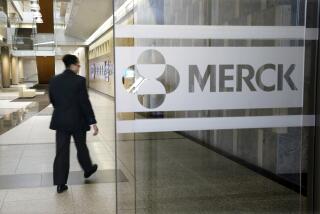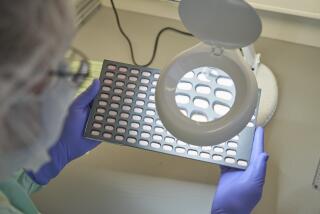Big Pharma bulks up with Merck deal
- Share via
Big Pharma got bigger on Monday with Merck Co.’s announcement that it would acquire rival Schering-Plough Corp. in a cash-and-stock transaction worth $41.1 billion. And the deal is being made easier by U.S. taxpayers.
Faced with tough competition from generics, fewer potential blockbuster drugs in development and the prospect of a government overhaul of the U.S. healthcare system, drug makers are consolidating.
In January, the world’s largest pharmaceutical company, Pfizer Inc., made a $68-billion bid for Wyeth. Meanwhile, Roche Holding is in hot pursuit of California-based Genentech Inc. On Monday, the Swiss drug maker, which already owns most of the South San Francisco biotechnology company, raised its hostile offer to $93 for each of Genentech’s remaining shares.
A deal between Merck and Schering-Plough would create the world’s second-largest pharmaceutical company with combined sales of about $47 billion in 2008. Structured as a so-called reverse merger, the transaction would have Schering-Plough continue as the surviving corporation, although the new entity would keep the Merck name. The new firm would be more diversified, have a larger global reach and a fatter array of products in gestation.
“The combined company will benefit from a formidable research and development pipeline,” said Merck Chairman and Chief Executive Richard T. Clark, who will lead the combined company.
But what may be good for the drug makers isn’t helping the U.S. job market. The pending deals are expected to result in at least 35,000 job losses, mostly in the U.S. -- helped in part by the government’s bailout efforts.
Banks that have received billions of federal dollars to encourage them to make loans -- JPMorgan Chase & Co., Goldman Sachs Group, Citigroup Inc. and Bank of America Corp. -- are lending money to Pfizer and Merck, who in turn are planning aggressive cost-cutting.
In the case of Pfizer, a takeover of vaccine specialist Wyeth would be expected to cost at least 19,000 jobs, including some in the companies’ overseas operations. A Merck takeover of Schering-Plough should yield about 16,000 layoffs. Combined, the cuts represent about 15% of those companies’ total workforces.
The deals would be virtually impossible to complete if the banks had not received money from the Treasury Department under the Troubled Asset Relief Program. The bailout enabled them to lend the drug makers a combined $31 billion.
“These mergers are only happening now because the drug companies can get the money from the banks to make the deals happen,” said Dr. John Abramson, a clinical instructor at Harvard Medical School and the author of “Overdosed America.”
“The TARP money is supposed to be loosening up credit and keeping Americans employed. They shouldn’t be using bailout money to get rid of people.”
Consumers aren’t likely to benefit either.
Healthcare policy analysts worry about the effect the mergers could have on prices. Drug prices increased 7.4% on average in 2007, according to AARP, about 2.5 times the rate of inflation.
“If the companies are saving money because of these efficiencies, they are not passing the savings on to consumers,” said Dr. Sidney Wolfe, director of the health research group for Public Citizen, a consumer advocacy organization based in Washington.
The pharmaceutical industry has long been among the most lucrative industries in the world, regularly posting double-digit profit margins. Among Fortune 500 drug companies, only Schering-Plough lost money in 2008. Pfizer, Merck and Wyeth boasted margins between 13% and 20%.
But Pfizer and Merck have the same problem. They depend heavily on a few big-name drugs for their growth and have few candidates in their pipelines to replace them as patent protection wanes in the coming years.
“It’s been hard for these companies to replace those drugs because much of the low-lying fruit has been picked,” said Dr. Gary S. Firestein, a dean and professor of medicine at UC San Diego.
As a whole, the industry has been slow to create new drugs. Between 1996 and 2006, the most recent year available, the number of new drug applications received by the Food and Drug Administration remained flat.
Pfizer faces a looming deadline for its cholesterol-lowering drug Lipitor, which will be open to competition from generics in 2011. Merck has had a series of high-profile flameouts, the most famous of which is Vioxx. The arthritis drug was pulled from the shelves in 2004 because of concerns that it caused heart problems.
After being sued by an estimated 50,000 patients, the company agreed in July to pay $4.85 billion to settle the cases.
Both acquiring companies hope that promising drugs being created by their slightly smaller peers could, with a little marketing magic, become blockbusters.
Merck and Schering-Plough already work together under a partnership to market the cholesterol drugs Vytorin and Zetia. Pfizer, already a giant, would grow about 45% with the Wyeth deal.
The deals would have to be approved by the Federal Trade Commission, which has not stopped the companies from mounting takeovers in the past. Job losses from big mergers are rarely a concern to regulators.
Pfizer spokeswoman Joan Campion told The Times that the company did not want to use a great portion of its stock to buy Wyeth for fear of diluting its share value. So the company, like Merck, turned to the banks and was able to secure $22.5 billion from JPMorgan Chase, Citigroup, Bank of America and Goldman Sachs. Combined, the companies have received more than $125 billion in TARP funding.
Bank of America alone has received $45 billion in TARP funding, including $20 billion to help it buy Merrill Lynch.
The deal would have been much more difficult without the bank loans, Campion said.
“A goal of TARP is to encourage banks to resume lending again -- essentially business getting back to business, with money flowing in the credit markets. By stabilizing banks’ capital ratios, the program can enable banks to make sound business loans that help fund long-term growth,” Campion said.
“We believe Pfizer’s proposed acquisition of Wyeth will ultimately create a stronger, healthier company, which is good for patients, the industry and long-term economic growth.”
--
--
BEGIN TEXT OF INFOBOX
At a glance
MERCK & CO.
Location: Whitehouse Station, N.J.
Top executive: Chairman and Chief Executive Richard T. Clark
Employees: 55,200
Major products: Asthma and allergy treatment Singulair, blood-pressure drug Cozaar, osteoporosis drug Fosamax, diabetes drug Januvia and human papillomavirus vaccine Gardasil
SCHERING-PLOUGH CO.
Location: Kenilworth, N.J.
Top executive: Chairman and Chief Executive Fred Hassan
Employees: 50,800
Major products: Arthritis and anti-inflammatory drug Remicade, allergy drug Nasonex, brain tumor treatment Temodar, and PegIntron for hepatitis C
Source: Associated Press
More to Read
Inside the business of entertainment
The Wide Shot brings you news, analysis and insights on everything from streaming wars to production — and what it all means for the future.
You may occasionally receive promotional content from the Los Angeles Times.










